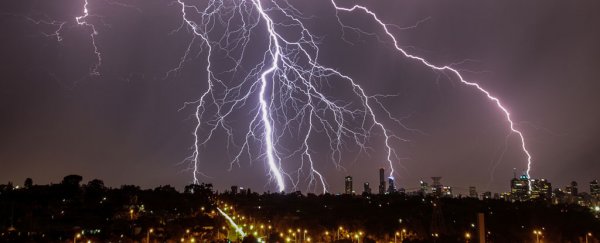Update: Four people have now died from the condition.
Two Australians have died and more than 2,000 others experienced breathing difficulties after a rare outbreak of 'thunderstorm asthma' on Monday – a phenomenon where weather changes brought on by storms can trigger widespread asthma attacks and breathing problems.
The condition is incredibly rare, but when it strikes it can be deadly. The danger is thought to be due to small particles in pollen that get released in wet weather, then dispersed by strong winds.
About 80 percent of people who experience asthma in Australia are susceptible to hay fever, an allergic response to rye grass pollen, which itself is composed of much smaller starch particles.
A single rye grass pollen grain can hold up to 700 of these tiny starch granules, measuring 0.6 to 2.5 um, which is small enough to reach the lower airways in the lung.
During rain or humid weather, the pollen grains can absorb water and swell, and will sometimes burst, releasing these tiny particles.
Along with high winds, which can spread the pollen or particles over a great distance, it's possible for hundreds or thousands of people to experience respiratory problems after inhaling these tiny particles into their lungs.
The latest instance of this rare condition began on Monday afternoon, after the Bureau of Meteorology issued a severe thunderstorm warning for Melbourne and other parts of Victoria.
The storm followed in the wake of an extremely hot 38-degree Celsius day (100.4 degrees Fahrenheit), and hit the city's west the hardest, with winds of up to 100 kilometres per hour recorded.
But while the building damage caused by the storm was relatively minor, the strong winds had also introduced a more subtle danger.
Emergency services were swamped by more than 2,000 phone calls – nearly seven times the usual number – with people reporting asthma attacks and other respiratory problems.
Hospital emergency departments did what they could, as ambulances – including some 60 vehicles brought out of reserve – ferried panicked people to care, with at least 30 people visiting intensive care.
"It was extraordinarily busy, it was unprecedented," Mick Stephenson, Ambulance Victoria's executive director of emergency operations, told the BBC.
"What we do know is that a lot of people who called last night had never had asthma before, so this was their first experience."
Sadly, at least two people are known to have died during the outbreak: 18-year-old Omar Moujalled, who was just two days from graduating high school; and law student Hope Carnevali. Carnevali, who was 20, died on her family's lawn, waiting for emergency services to arrive.
Those that did receive treatment in hospitals were cared for amid chaotic scenes.
"The emergency physicians say not only have they never seen anything like that before, they've never seen so many people arrive at one time all suffering the same condition," St Vincent's Hospital spokeswoman Kathy Bowlen told the ABC.
"We were considering opening a second emergency department… We ran out of Ventolin puffers at one point."
Pharmacies were also flooded by customers desperately seeking inhalers.
"I have never seen anything remotely like it, in 25 years of working in pharmacy," pharmacist Peter O'Connor told Megan Haggan at AJP.
"I'm still traumatised! It was the busiest I've ever seen a pharmacy."
Similar thunderstorm asthma events have struck Melbourne in 2010 and 2011, although this week's incident was far more serious.
"One of the reasons we know about thunderstorm asthma in Melbourne is we have a pollen count here, so we can make associations between pollen and these events, which have happened before," botanist Ed Newbigin from the University of Melbourne told Melissa Davey at The Guardian.
"But they're such infrequent events they're hard to research."
The phenomenon has also been observed in the US, UK, Canada, and Italy.
According to those who have experienced thunderstorm asthma, it sounds like a pretty terrible feeling.
Melbourne resident David McGann said the phenomenon was three to four times worse than his regular asthma had ever been.
"It was insane, I couldn't get off the couch for three hours last night just due to shortness of breath," he told the ABC.
"It felt like an elephant had his foot on my chest for about four hours."
